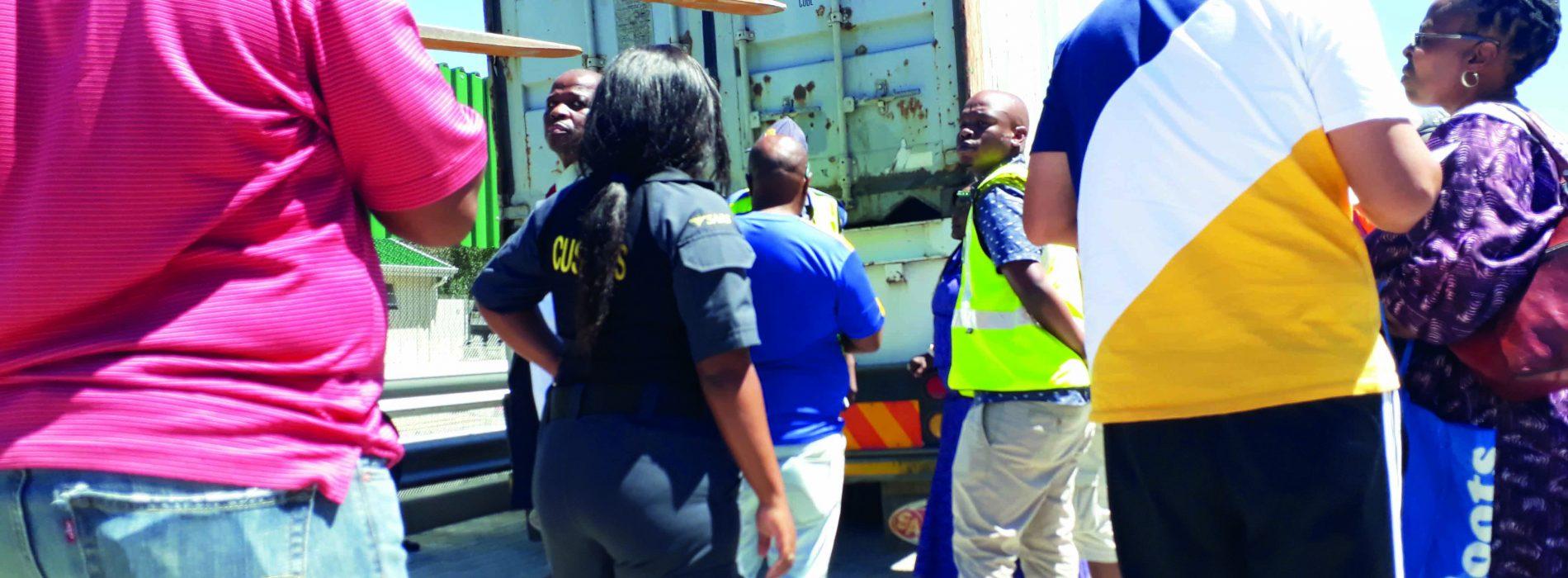Africa-Press – Lesotho. Lesotho Wool Centre’s failure to secure a veterinary transit (export) permit has caused its 1248 bales of wool worth M21 million and destined for China to be barred from passing through South Africa.
The wool, ferried in 12 trucks from Thaba-Bosiu in the Maseru outskirts but was dramatically barred entry into South Africa at the Maseru border on February 16, may remain blocked from transit for weeks until the required permit is secured.
Maseru Dawning Trading (Pty) Limited, a Chinese owned broker that has controversially secured a government deal to auction and export the product under the umbrella of the Lesotho Wool Centre, has previously succeeded to evade mandatory procedures and transited the wool unlawfully through South Africa to China.
The MNN Centre for Investigative Journalism has learnt from Dr Luana Schoeman, a Deputy Director: Import Export Policy Unit of Animal Health in the South African Department of Agriculture, Forestry and Fisheries, that the general procedure of the World Organisation for Animal Health is that for any animal product in transit “countries may require some documentation”.
In South Africa, Schoeman noted, is was a must that the documentation should include a health certificate from the place where the animal product originates, a veterinary transit permit and shipment in a sealed container.
“In South Africa, in-transit or imports are treated the same way. Anyone who wants to export must apply for a transit permit which takes about five days without hiccups,” Schoeman said.
Another South African official who refused to be named said taking the current situation, “there should be a motivation why permit should be issued to a business in Lesotho as we currently issue such permits to South Africans only”.
The source told the Centre that for the wool to be transported to a port through South Africa, an earlier agreed-on procedure between the two countries should be followed.
The procedure, the source said, entailed “putting the shipment into a sealed container, getting a veterinary transit permit, health certificate to avoid being pulled off road or being checked”.
The source continued in a case where there are misunderstandings similar to the matter, “we would need to have the producer in Lesotho to contact the veterinary authorities and they, in turn, write to their South African counterparts and a meeting of the vets should be convened for negotiations.
”
Small Business Minister Chalane Phori has said, in an interview with the Centre on Tuesday this week, that plans were afoot for an entourage from Lesotho to hold a meeting with the relevant authorities in South Africa.
When the wool was initially blocked from passing through South Africa on Saturday, the Centre heard it was over smuggling suspicions by South African law enforcement agencies.
But Stone Shi, the Chinese-origin businessman behind the controversial monopoly given to him by the Lesotho government to act as the only broker for the country’s wool industry, has argued this was not the first time the wool passed through the border without the permit.
The Centre was at the border when one of the agricultural inspectors from South Africa pressed the Maseru Dawning team exporting the wool to open containers for inspection.
Shi showed the Centre his export certificates issued by the Lesotho Director General — Veterinary Services Dr Relebohile Mahloane titled “International veterinary certificates for Greasy wool and mohair export to People’s Republic of China from Kingdom of Lesotho” for each truck.
The certificate showed the wool was destined for Zhang Jia Gang in China. Shi, refuted claims that his company was smuggling the wool out of Lesotho and argued that this was not the first batch of wool being exported by his company.
He said his business was purposely being sabotaged by third forces who were hellbent to frustrate him since he got the deal from government early last year.
Among some of the Lesotho government officials who attended the wool debacle on Saturday was Dr Mahloane. “We have been waiting for reasons why trucks were stopped but nothing concrete is being said by the technicians on duty.
All we have are truck drivers who were told we issued fake certificates,” Mahloane said. He added he had brought copies of the certificates from his office to verify their authenticity.
“I wanted these South African officials to say why they alleged my certificates to be fake,” he said, fuming.
Mahloane argued the wool should not be subjected to any intrusive inspection as it is in transit to China under a clear Lesotho-China bilateral agreement.
“We have a Sanitary and Phyto-sanitary agreement working under the World Trade Organisation auspices. It has mandates from three organisations of international trade on safety on diseases.
South Africa has questioned our authority but we believe they are influenced by external forces with ulterior motives,” Mahloane charged. He argued the South African agricultural inspection officials acts that have resulted in the wool being stuck at the border were in contravention of international trade protocols.
Mahloane dismissed claims that the wool maybe blocked from passing the border due to the suspension of greasy wool importation suspension by China. “If it was true, China could have refused to accept wool importation from Lesotho,” he argued.
The South African officials, Mahloane said, had violated the Terrestrial Code which provided that sealed trucks and containers should not be opened by authorities of the country of transit.
“I must admit that in most cases we work well with our South African counterparts and if there are suspicions of smuggling of goods from other countries, we work together to ensure that we catch smugglers and get them arrested,” he said.
He was, however, quick to note he was worried “that they now seem to be used to further interests of other people who are opposed to the new changes happening in the Lesotho wool industry.
”
The veterinary expert said, as the officer with the sole responsibility for certifying the authenticity and health of agricultural products leaving the country, his signature carried weight internationally.
Manama Letsie, the Maseru Dawning Spokesperson, said the wool’s further delay will result in escalated costs in delivery of the product to the port in Durban, or worse, shipment of the wool to China failing altogether.
“When that ship leaves Durban without the wool, that would cost us M500, 000.00 in shipping costs. These claims of wool smuggling are false and fabricated by those opposed to the localisation of the wool industry,” said Letsie.
One of the former wool traders and a local veterinary surgeon with vast experience in the history of wool production in Lesotho, Dr Mohlalefi Moteane, who was seen at the border following the trucks from Maseru and suspected to have been the one who insinuated the stoppage, refuted claims he persuaded the inspectors to block the transition.
“My mere presence triggers them to say I did block them from passing. But I have no such powers.
The question is whether they have fulfilled all necessary documentation that requires applications for veterinary transit permits to be filled and certain certification to be issued,” Moteane said.






